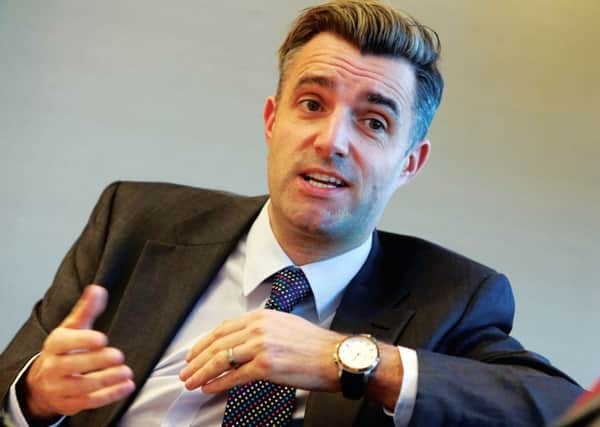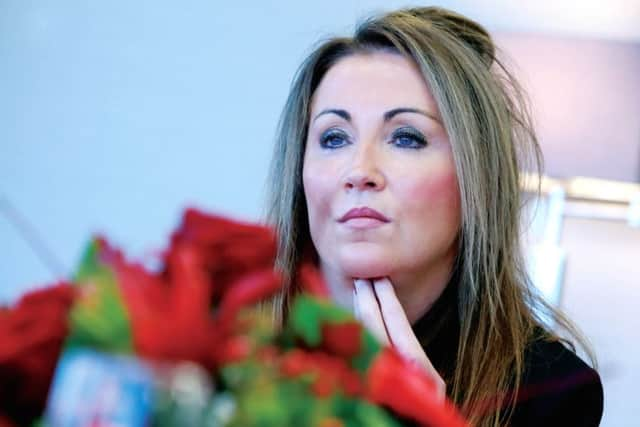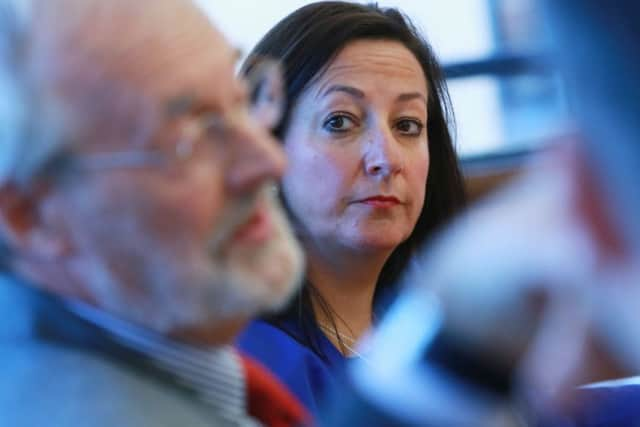Employers and employees are key players in a responsible business


When it comes to responsible business, what is the role of employers – and what, in turn is their responsibility to their employees and to wider society? The Edinburgh office of legal firm Anderson Strathern hosted a round table discussion about how the roles and responsibilities work together.
John Bratton (JB): Society and business are very closely interlinked. I have worked with companies and looked at best practices and what principles underpin them – and the benefits arising from them. There is a real interest in social justice and environmental change – about how can we change behaviour to decarbonise workplaces. The trick, especially for SMEs, is getting the balance right. Where do you find resources?
Advertisement
Hide AdAdvertisement
Hide AdAn organisation’s culture features high in all the surveys about the best workplaces. The First Minister wants Scotland to have a good work-life balance and make it a good place to do business as well as to work.


I have done some work on small cities and what attracts people to them. It’s about the quality of life, but that is also about the quality of the job opportunities.
Linda Adams (LA): We have seen people moving back to Scotland for its culture, environment and work-life balance, but not giving up on the commercial side.
Sarah McParland (SM): Since the worst of the downturn, rural locations have been able to attract very talented people. There has been a move towards places like Highland Perthshire to seek out that quality of life – with access to countryside and good schools.
Also, newly-qualified professionals are asking much more about the culture of a business and its work-life balance. That’s unusual and represents a shift among millennials against working long hours and weekends without question.


Marshall Dallas (MD): Edinburgh is a relatively small city which offers a phenomenal quality of life.
There has been a seismic shift in terms of what people want. We are a commercial operation but have to change the way we operate to reflect the desire by employees for a better work-life balance and a more positive culture. We need to embrace this and rejoice in it.
Chris McDowall (CM): New recruits and clients tell us that they like the fact that we have the double gold Investors in People, that we are signed up to the Scottish Business Pledge and that we are a Fair Work employer. Is it hassle or extra work? I think it’s clear that it delivers business benefit.
Advertisement
Hide AdAdvertisement
Hide AdThere is a broader responsibility too. Our contractors – caterers, cleaners and so on – need to pay the living wage or we will not contract with them. It’s an important opportunity to influence change. We pick up the costs as a business but it’s right that we do that.


SM: You can be guilty by association if you contract with a business not aligned with your values, if you know people are being overworked or have a bullying culture.
You need to understand your core values and what they mean – and think about who you do business with. Will they do a good job and do they have a strong culture and practices?
LA: What you put in, you get out. Staff ask much more about things like the firm’s carbon impact now; people feel better if they think an organisation is investing in them but also in the wider environment.
SM: It’s much easier with technology to find out about a company’s values, vision and culture, to decide if that’s a business you want to work for.


CM: It’s about what kind of business you are and if people want to do business with you.
MD: It’s becoming bigger than just a combination of being commercially successful and socially and environmentally responsible.
What’s moving up the agenda is legacy. Do you want to be involved in a business that isn’t interested in wider society and environment and cares about nothing but the bottom line? It’s about the legacy that all these different issues produce.
Advertisement
Hide AdAdvertisement
Hide AdCM: Giving your staff an effective voice is also very important. Many of the best ideas come from staff engagement and the ability to move away from doing something because it’s the way you’ve always done it.
LA: Greater mobility brings new ideas into a firm – from different countries and from different sectors.
JB: When you recruit globally and bring in talent, you have to give your new people the opportunity to share their diverse experiences.
There are real dangers of a lack of motivation and morale if you don’t offer input to staff and don’t communicate well. There’s a solid business case for giving people a voice. The evidence is overwhelming.
LA: It’s about that legacy – not just about providing business solutions but providing the right working environment for staff. Mobility does makes it harder to retain people – they are more likely to move, but also more likely to come back.
SM: Staff who leave a business are no longer seen as persona non grata – they can come back. Business has grown up.
MD: What you do with your profits is important. The EICC is expensive to run and you have to reinvest a lot. But it’s about more than that and we decided to set up a hotel school. It will offer a masters in business events for 15 students from September 2017.
My experience is that we have very good young people, but they don’t always have a balance of academic, vocational and personal skills.
Advertisement
Hide AdAdvertisement
Hide AdThrough the hotel school, we can embed this in our company and offer a wide range of skills – it could be sales and marketing, technical, concierge, food and beverage. If you come and study here, you will be part of a living, working business but you will have to contribute. It’s a separate initiative but it’s embedded in the business at the same time.
LA: Mentoring is really important in the workplace too. It’s a two-way thing; employees benefit and the employer benefits.
JB: There is an argument for businesses to build mentoring formally into appraisals – either internal or external mentoring.
CM: There are lots of small, simple things any business of any size can do – make time for mentoring, give talks in schools, offer work placements. However, we need to get businesses to think together more strategically. How do we share all these positives?
SM: I allow employees two days a year to go out and do whatever they want, but I think I’m in a minority.
MD: When you sit down and look at time commitment, it’s not a big ask. If there is an incentive for staff, things get done more quickly and better. We are working with Citadel Youth Centre in Leith and we’ll take five to nine people down at a time [from a staff of under 50] to help in any way they want. We might be painting the canteen but we also want our employees to speak to people there and do things with them.
CM: It’s about that buy-in from boards and senior management teams. Without support at senior level, it’s all rhetoric. Senior people have to show an example.
MD: I’m sleeping rough on 15 December to support Social Bite. Josh Littlejohn sold it to me by saying it was a one-off, a few hours for me. For homeless people, it’s their lives.
Advertisement
Hide AdAdvertisement
Hide AdJB: There is lots of good practice, but we need to measure benefit and create a toolkit that can be used by small businesses.
CM: I think we are getting some structure into this area with the Fair Work Convention and publication of the SNAP-RB action plan.
MD: Responsible business is here to stay. We all need to be proud of our commercial elements and not be afraid to make a profit, but we also must ensure our social and environmental responsibilities are on an equal footing.
It’s about balance. The next generation has a very positive attitude to responsible business and we will continue in that direction. Quality is also really important. It’s about asking “is this the best we can be?”. We might be good – but we can always be better.
JB: We need to understand that success is multi-dimensional – focus on what is important and the profits will take care of themselves. We also need to focus on quality – and foster that culture of continuous improvement via reflective questions and both formal and informal learning.
John Bratton is a visiting professor at Edinburgh Napier University Business School who spent 20 years working in Canada and has specific expertise in workplace learning.
Marshall Dallas is chief executive of Edinburgh International Conference Centre, and has enjoyed a long career in the leisure and hospitality sectors, as well as healthcare.
Sarah McParland is group managing director of Lusona Consultancy, which specialises in professional recruitment and executive search. She qualified as a lawyer and worked as a chartered accountant and is chair of Young Enterprise Scotland.
Advertisement
Hide AdAdvertisement
Hide AdLinda Adams is HR manager at Anderson Strathern, and has worked in the legal industry for over 20 years. Before then, she worked for the Foreign & Commonwealth Office in London and Dubai.
Chris McDowall is HR partner, employment lawyer and a member of the senior management team at Anderson Strathern. He heads the firm’s management training programme and is an accredited workplace coach.